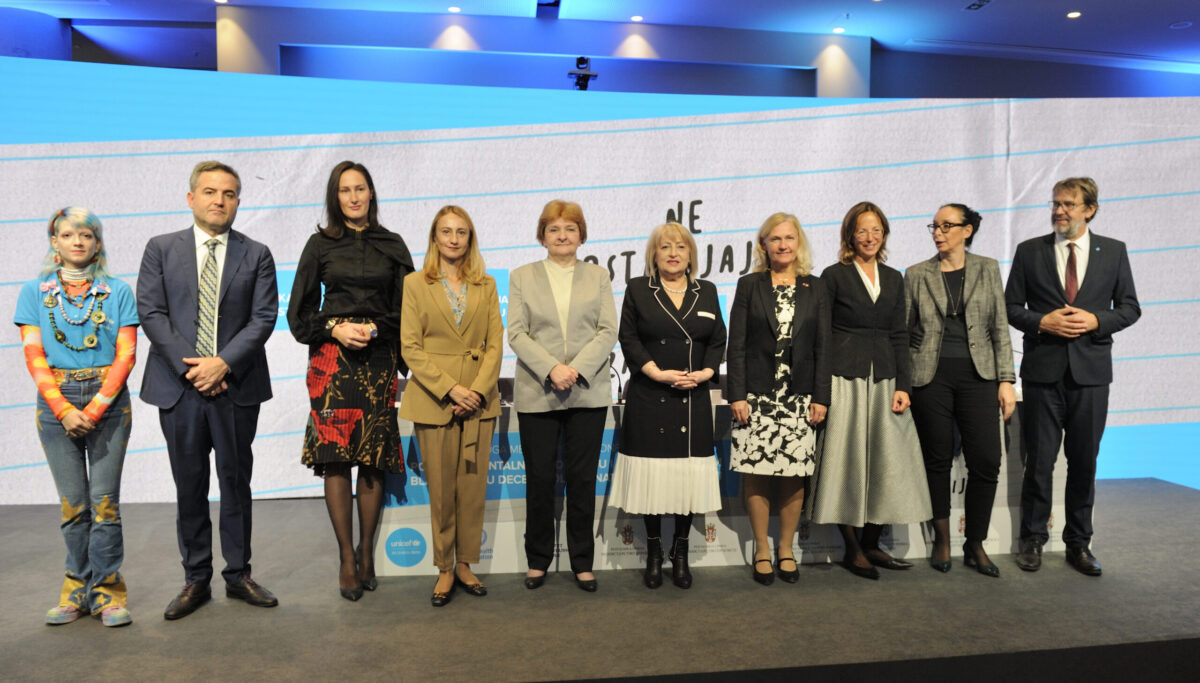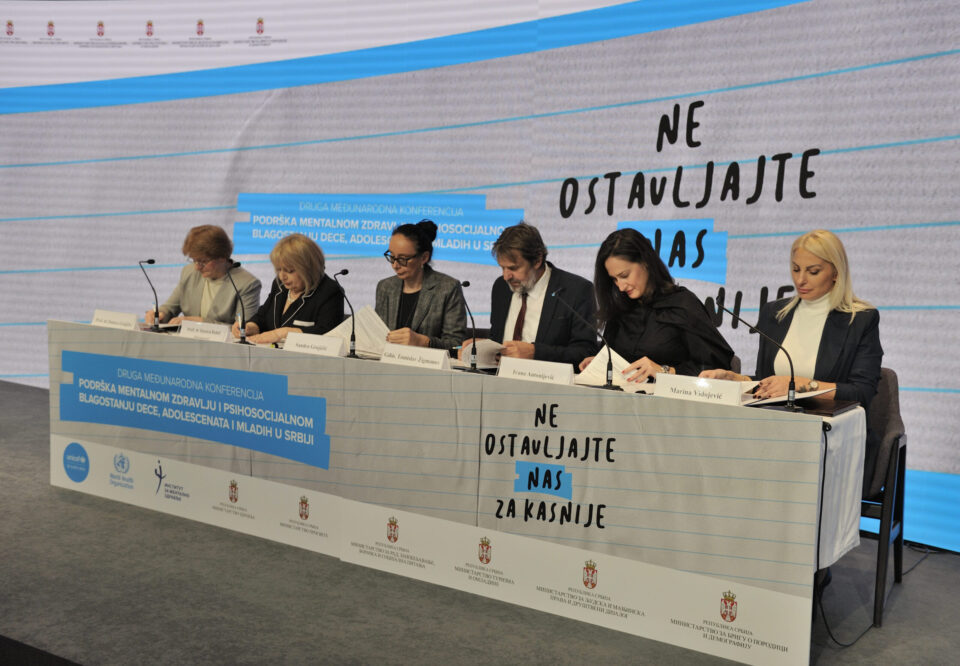State invests additional effort into supporting the mental health of young people in Serbia

In Belgrade, on October 16, 2023, six government ministries signed a Memorandum of Understanding at the second International Conference dedicated to mental health and psychosocial support of young people called “Don’t leave us for later” to improve the mental health support system for children and young people in Serbia. The memorandum, which defines in more detail the distribution of resources, roles and responsibilities of the departments in mental health protection of children, adolescents and young people, was signed by the Ministry of Health, the Serbian Ministry of Education, the Ministry of Tourism and Youth, the Ministry of Labour, Employment, Veteran and Social Affairs, the Ministry of Human and Minority Rights and Social Dialogue and the Ministry of Family Care and Demography.
Deyana Kostadinova, director of UNICEF in Serbia, underlined that every child deserves the right to good mental health and well-being, especially if we take into account the findings of the U-Report survey from August this year, which show that about 47 percent of survey participants confirmed that young people do not ask for help, because they consider it a sign of weakness and are afraid of being judged. Almost half of the young people, 46 percent of them, use social media and the Internet as a source of information on how to take care of mental health, while only 5 and 7 percent see teachers and health workers respectively as someone they can talk to about their problems.
“Six key government ministries today showed unity by signing a Memorandum of Understanding. In this way, they bolstered their commitment to improving the emotional well-being of children, adolescents and young people in Serbia. The collective commitment they made is more than an agreement; it means an investment in our common future, but it is also proof that an investment in the mental health of an individual is an investment in the resilience of our community. Together we can build a more peaceful and prosperous society in which the well-being of our youth becomes the cornerstone of our strength,” said Deyana Kostadinova.
Minister of Education, Professor Slavica Djukić Dejanović, MD, highlighted the importance of boosting the crisis response system and universal access to mental health care services for adolescents and young people across the country.
“It is important that everyone in the system and society see young people because unrecognized mental health problems affect their interaction in the community, as well as the relationships they build with others. Therefore, it is of inestimable importance to strengthen intersectoral cooperation and coordinated action of all relevant institutions in order to recognize early and respond in a timely manner to situations, because we all need to work together to raise awareness about the preservation of mental health in the community. The conference participants unanimously agreed that interdepartmental cooperation and adequate coordination of resources are of vital importance for the mental health of children and young people,” said Professor Slavica Djukić Dejanović, MD, Minister of Education.
“The mental health and well-being of children and young people deserves a key place in public health, as well as the prevention of mental disorders. In our country, it is still the most dominant medical model of providing support to young people with mental health problems and the world is increasingly talking about the ‘step by step’ approach, where services are provided in different sectors and levels in line with the psychosocial support principles. By signing the memorandum, it is possible to provide support to our youngest at all levels and in all systems where children and young people reside. With the use of a unique narrative and key pillar of support when working with young people, they should receive support where it is most feasible and available. Working with children and young people requires time, a motivated expert and conditions that would ensure that the provision of psychosocial interventions, which are promoted through UNICEF’s project Orygen and the Institute for Mental Health, whereby required and everyday support is provided to children and young people. Investing in children and young people is investing in the future of our society”, said Professor Milica Pejović Milovančević, MD, Director of the Institute for Mental Health.
Professor Fabio Scano, MD, director of the World Health Organization in Serbia and special envoy of the regional director of the WHO for the Western Balkans, pointed out the importance of innovative approaches to support the mental health and well-being of children and young people.
“The latest WHO data shows that life satisfaction and self-rated health among young people in the European region decreased between 2018 and 2022. I can proudly say that the WHO in Serbia is already supporting the Ministry of Health in improving the capacity of mental health experts in health centres and schools so that they can develop and implement appropriate and sustainable programmes focusing on the needs of young people,” said Professor Fabio Scano, MD, Director of the WHO in Serbia.
As a result of the programme for mental health and psychosocial support for young people in Serbia, young people have been given access to reliable information and professional support through the interactive online platform called svejeok.rs, which has been visited by more than 90,000 people since 2021.
“Given that mental health affects all aspects of life, as well as the further development of children and young people, I’m glad there are resources to help us safeguard wellbeing. Ultimately, mental health care helps us young people develop their potential and build resilience. I am glad that UNICEF is part of this movement to reduce the stigma towards seeking psychological help. It is important for me to know that I have the right to help, as well as to have the support of professionals whose main goal is my well-being. The svejeok.rs platform is particularly important. There you can find really useful information about the pressing problems in the lives of our young people and how to solve them. And parents can also get information and an idea of how to talk to their children and how to help them”, believes Gabi Petković from UNICEF’s youth committee.
The Ambassador of the Kingdom of Norway to Serbia, H.E. Kristin Melsom, pointed out the similarities between the problems of young people in Norway and Serbia when it comes to mental health. She said that Norway provides continuous support to the issues related to the mental health of young people in Serbia through cooperation with the Government of the Republic of Serbia and UNICEF.
In order to involve experts from different sectors in working with young people, UNICEF, in cooperation with the Ministry of Health, defined a minimum set of services for mental health and psychosocial support for young people in Serbia, the so-called MZPP programme.
The programme results
Forming an expert group from all sectors that will deal with mental health protection and a revision of the legislative framework are proposed to bolster the provision of services at the local level.
UNICEF supported OPENS and a network of 15 non-governmental organizations and institutions from Novi Sad to provide continuous support to young people in Vojvodina and throughout Serbia via individual online and offline counselling, as well as group, chat and telephone sessions. Thanks to these services, 5,948 young people received support.
Since 2021, via the svejeok.rs platform, which provides young people with relevant and safe information about mental health, young people have had 350 individual and 4,690 phone sessions, as well as 2,538 chat sessions.
In partnership with the Institute for Mental Health, 450 young people from Zrenjanin, Kragujevac and Subotica used innovative psychosocial support counselling services in schools, health centres and social welfare institutions given by 160 trained professionals. Telehealth services have also been tested in the Serbian healthcare sector.
